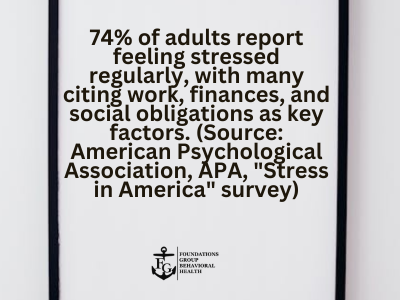In today’s world, life moves at an unprecedented pace. Technology, demanding schedules, and societal expectations have created a culture of constant busyness, leaving many people feeling overwhelmed, stressed, and disconnected. These factors contribute significantly to the rise in anxiety and depression, which are now among the most common mental health disorders globally.
As these challenges grow, understanding their root causes and seeking effective treatment is more important than ever. With the support of programs such as Psychiatric Day Treatment, Half-Day Treatment Programs, and Outpatient Mental Health Programs, individuals can regain control over their mental health and find a path toward healing.
How the Fast Pace of Modern Society Contributes to Mental Health Challenges
1. Technology and the Era of Constant Connectivity
One of the most profound changes in modern life is the integration of technology into every aspect of our daily routines. Smartphones, social media, and instant messaging have created an environment where we are always “on.” This constant state of connectivity leads to:
- Information Overload: The sheer volume of news, updates, and content available can overwhelm the brain, causing decision fatigue and anxiety.
- Social Comparison: Platforms like Instagram and Facebook encourage comparisons to the often-curated lives of others, which can contribute to feelings of inadequacy, loneliness, and depression.
- Sleep Disruption: The blue light from screens and the habit of checking devices late at night disrupt natural sleep cycles, which is directly linked to mood disorders like anxiety and depression.
2. Over-Scheduling and the Glorification of Busyness
Society has created a culture where being busy is often seen as a badge of honor. Many individuals juggle demanding careers, family responsibilities, social obligations, and personal ambitions. This relentless pace leaves little time for rest or self-care.
- Chronic Stress: Over time, constant busyness leads to chronic stress, which has been linked to increased rates of anxiety and depressive disorders.
- Burnout: Pushing oneself to the limit without adequate recovery can result in emotional exhaustion, detachment, and a reduced sense of accomplishment—all hallmarks of burnout, which is often accompanied by depression.
3. Economic and Career Pressures
The modern job market is more competitive than ever, with individuals feeling the pressure to achieve, outperform, and secure financial stability. These pressures can lead to:
- Fear of Failure: Constantly worrying about job performance or financial insecurity can exacerbate anxiety.
- Imposter Syndrome: Many people struggle with self-doubt and fear that they aren’t truly qualified for their roles, leading to chronic stress and low self-esteem.
- Economic Inequality: Rising living costs and stagnant wages leave many individuals feeling trapped, further fueling feelings of hopelessness and depression.
4. Erosion of Social Connections
Despite being more “connected” than ever through technology, many people feel isolated and lonely. Modern lifestyles often prioritize individualism and productivity over community and relationships. The decline in meaningful human interaction can result in:
- Loneliness: Loneliness is a significant risk factor for both anxiety and depression, particularly in young adults and seniors.
- Lack of Support: Without strong social networks, individuals struggling with mental health challenges often feel unsupported and unable to cope.
5. Global Uncertainty and Existential Anxiety
Events such as climate change, political instability, and global pandemics have created a backdrop of uncertainty and fear. Many people feel powerless in the face of these challenges, leading to pervasive feelings of anxiety and despair.
Recognizing When You Need Help
While everyone experiences stress and sadness at times, it’s important to recognize when these feelings become persistent and begin to interfere with daily life. Signs that you may need professional support include:
- Physical Symptoms: Chronic headaches, stomach issues, or other physical complaints with no clear medical cause.
- Emotional Changes: Persistent feelings of sadness, hopelessness, irritability, or fear.
- Behavioral Shifts: Withdrawing from loved ones, losing interest in activities, or difficulty completing daily tasks.
- Sleep and Appetite Changes: Insomnia, sleeping too much, or changes in eating habits.
- Thoughts of Self-Harm or Suicide: If you are experiencing these thoughts, it is crucial to seek immediate help.
If these symptoms resonate with you or a loved one, seeking support from programs like a Depressive Disorder Treatment Program or an Anxiety Treatment Program can make a significant difference.

How Behavioral Health Treatment Programs Can Help
Modern mental health challenges require a modern approach to treatment. Comprehensive care programs such as Psychiatric Day Treatment, Half-Day Treatment Programs, and Outpatient Mental Health Programs provide the flexibility and support needed to address anxiety and depression effectively.
1. Psychiatric Day Treatment
This intensive program is designed for individuals who need a higher level of care than traditional outpatient therapy but do not require hospitalization. It offers:
- Structured Treatment Plans: Patients participate in therapy sessions, psychoeducation, and skill-building exercises throughout the day.
- Flexibility: The program allows individuals to return home in the evening, maintaining connections with family and their daily routines.
- Holistic Care: Focuses on both mental and physical well-being, addressing the interconnected nature of anxiety, depression, and overall health.
2. Half-Day Treatment Programs
Ideal for those with moderate symptoms, half-day programs provide focused care without requiring a full-day commitment. Key benefits include:
- Therapeutic Support: Individual and group therapy sessions help patients explore their challenges and develop coping strategies.
- Life Balance: Patients can receive treatment while still managing other responsibilities, such as work or caregiving.
- Skill Development: Emphasis on mindfulness, stress management, and resilience-building.
3. Outpatient Mental Health Programs
Outpatient programs are perfect for individuals with mild to moderate symptoms who want to maintain their daily routines while receiving treatment. These programs focus on:
- Flexible Scheduling: Evening and weekend sessions make it easier to fit therapy into a busy lifestyle.
- Evidence-Based Therapies: Modalities like Cognitive Behavioral Therapy (CBT) and Dialectical Behavior Therapy (DBT) help patients address the root causes of their symptoms.
- Community Support: Opportunities to connect with peers facing similar challenges foster a sense of belonging and reduce isolation.
4. Co-Occurring Disorder Treatment Programs
Anxiety and depression often occur alongside substance use disorders or other mental health challenges. Co-occurring disorder programs provide integrated care, addressing both issues simultaneously for a comprehensive approach to recovery.
Foundations Group Behavioral Health: A Partner in Recovery
At Foundations Group Behavioral Health, we understand the unique challenges posed by today’s fast-paced society. As a leading Behavioral Health Treatment Center in Massachusetts, we offer a range of programs tailored to meet individual needs, including:
- Anxiety Treatment Programs: Focused on reducing symptoms, improving coping skills, and addressing the underlying causes of anxiety.
- Depressive Disorder Treatment Programs: Designed to help individuals manage their symptoms, regain a sense of hope, and build a fulfilling life.
- Co-Occurring Disorder Treatment Programs: Providing specialized care for individuals dealing with overlapping mental health and substance use disorders.
Our team of experienced clinicians uses evidence-based therapies to help patients achieve lasting recovery. From individual and group therapy to skill-building workshops and holistic interventions, we provide comprehensive support every step of the way.
Steps to Take Toward Better Mental Health
If you’re feeling overwhelmed by the pressures of modern society, remember that you don’t have to face these challenges alone. Recovery starts with taking the first step:
- Reach Out for Help: Contact a mental health professional or treatment center for an initial assessment.
- Explore Your Options: Choose a program that fits your needs, whether it’s a Psychiatric Day Treatment Program, a Half-Day Treatment Program, or an Outpatient Mental Health Program.
- Commit to Self-Care: Prioritize activities that support your mental health, such as exercise, mindfulness, and connecting with loved ones.
At Foundations Group Behavioral Health, we’re here to guide you on your journey to better mental health. If you or a loved one is struggling with anxiety, depression, or co-occurring disorders, contact us today to learn more about our programs and how we can help. Contact us today at 888.685.9730 to learn more about our programs and take the first step toward recovery.
FAQ on Anxiety and Depression
How does modern society contribute to anxiety and depression?
Modern society contributes to anxiety and depression through constant connectivity, over-scheduling, financial pressures, and the erosion of meaningful social connections. The fast-paced lifestyle leaves little time for self-care, leading to chronic stress and burnout.
What are the symptoms of anxiety and depression caused by modern life?
Symptoms may include persistent fatigue, feelings of hopelessness, irritability, changes in sleep patterns, difficulty concentrating, and physical complaints such as headaches or stomach issues.
What types of treatment programs are available for anxiety and depression?
Programs such as Psychiatric Day Treatment, Half-Day Treatment Programs, and Outpatient Mental Health Programs provide structured care, therapy, and coping skills tailored to individual needs.
What is Psychiatric Day Treatment, and how can it help?
Psychiatric Day Treatment is an intensive program offering structured therapy, psychoeducation, and skill-building while allowing individuals to return home daily. It helps address anxiety, depression, and co-occurring disorders without requiring hospitalization.
Can outpatient programs address anxiety and depression effectively?
Yes, outpatient programs are highly effective for individuals with mild to moderate symptoms. They offer therapy sessions, flexibility for daily responsibilities, and evidence-based treatments like Cognitive Behavioral Therapy (CBT) and Dialectical Behavior Therapy (DBT).
What are co-occurring disorders, and how are they treated?
Co-occurring disorders refer to the presence of both a mental health disorder (like anxiety or depression) and a substance use disorder. Integrated treatment programs address both conditions simultaneously for holistic recovery.








